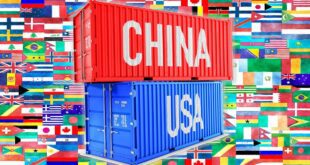Today, more than 60% of all foreign currency reserves in the world are in U.S.  dollars – but there are big changes on the horizon…Some of the biggest economies on earth have been making agreements with each other to move away from using the U.S. dollar in international trade…[and this shift] is going to have massive implications for the U.S. economy. [Let me explain what is underway.] Words: 1583 @A Financial Site For Sore Eyes & Inquisitive Minds
dollars – but there are big changes on the horizon…Some of the biggest economies on earth have been making agreements with each other to move away from using the U.S. dollar in international trade…[and this shift] is going to have massive implications for the U.S. economy. [Let me explain what is underway.] Words: 1583 @A Financial Site For Sore Eyes & Inquisitive Minds
[NOTE: This post is presented by Lorimer Wilson, editor of www.munKNEE.com and the free Intelligence Report newsletter (see sample here ). The original article has been edited ([ ]), abridged (…) and/or reformatted (some sub-titles and bold/italics emphases) for the sake of clarity and brevity to ensure a fast and easy read. This paragraph must be included in any article re-posting to avoid copyright infringement.]
Snyder goes on to say, in part:
@$$4$China has the second largest economy on the face of the earth, and the size of the Chinese economy is projected to become three times larger than the U.S. economy by the year 2040 by at least one economist. [As such,] China is sitting there and wondering why the U.S. dollar should continue to be so preeminent if the Chinese economy is about to become the number one economy on the planet.@Economic Developments
@$China, and other emerging powers such as Russia, have been quietly making agreements to move away from the U.S. dollar in international trade over the past few years [and, as such,] the supremacy of the U.S. dollar is not nearly as solid as most Americans believe it to be.
@$As the U.S. economy continues to fade, it is going to be really hard to argue that the U.S. dollar should continue to function as the primary reserve currency of the world. Things are rapidly changing, and most Americans have no idea where these trends are taking us.
The following are 10 reasons why the reign of the dollar as the world reserve currency is about to come to an end:
#1: China And Japan To Use Own Currencies In Bilateral Trade
A few months ago, the second largest economy on earth (China) and the third largest economy on earth (Japan) struck a deal which will promote the use of their own currencies (rather than the U.S. dollar) when trading with each other. This was an incredibly important agreement that was virtually totally ignored by the U.S. media. The following is from a BBC report about that agreement:
“China and Japan have unveiled plans to promote direct exchange of their currencies in a bid to cut costs for companies and boost bilateral trade. The deal will allow firms to convert the Chinese and Japanese currencies directly into each other. Currently businesses in both countries need to buy US dollars before converting them into the desired currency, adding extra costs.”
Editor’s Note: Enjoying the article so far? If so, please DONATE a little something so I can continue to bring you such informative articles.
#2: The BRICS Plan To Use Own Currencies When Trading With Each Other
The BRICS continue to flex their muscles. A new agreement will promote the use of their own national currencies when trading with each other rather than the U.S. dollar. The following is from a news source in India:
“The five major emerging economies of BRICS — Brazil, Russia, India, China and South Africa — are set to inject greater economic momentum into their grouping by signing two pacts for promoting intra-BRICS trade…The two agreements will enable credit facility in local currency for businesses of BRICS countries…[which is] expected to scale up intra-BRICS trade that has been growing at the rate of 28% over the last few years but, at $230 billion, remains much below the potential of the five economic powerhouses.”
#3: China and Russia Use Own Currencies In Bilateral Trade
Leaders from both Russia and China have been strongly advocating for a new global reserve currency for several years, and both nations seem determined to break the power that the U.S. dollar has over international trade. [In fact,] Russia and China have been using their own national currencies when trading with each other for more than a year now.
#4: Use Of Chinese Currency Growing In Africa
Who do you think is Africa’s biggest trading partner? It isn’t the United States. In 2009, China became Africa’s biggest trading partner, and China is now aggressively seeking to expand the use of Chinese currency on that continent.
China seems absolutely determined to change the way that international trade is done. At this point, approximately 70,000 Chinese companies are using Chinese currency in cross-border transactions.
#5: China and United Arab Emirates To Use Own Currencies In Bilateral Trade
China and the United Arab Emirates have agreed to ditch the U.S. dollar and use their own currencies in oil transactions with each other.
The UAE is a fairly small player, but this is definitely a threat to the petrodollar system. What will happen to the petrodollar if other oil producing countries in the Middle East follow suit?
#6: India To Use Gold To Buy Oil From Iran
Iran has been one of the most aggressive nations when it comes to moving away from the U.S. dollar in international trade. For example, it has been reported that India will begin to use gold to buy oil from Iran.
#7: Saudi Arabia Likely to Abandon Use of Petrodollar in Dealings With China
Who imports the most oil from Saudi Arabia? It is not the United States, it is China…Saudi Arabia and China have teamed up to construct a massive new oil refinery in Saudi Arabia…so how long is Saudi Arabia going to stick with the petrodollar if China is their most important customer?
#8: The United Nations Continues to Push For A New World Reserve Currency
The United Nations has been issuing reports that openly call for an alternative to the U.S. dollar as the reserve currency of the world. In particular, one UN report envisions “a new global reserve system…that no longer relies on the United States dollar as the single major reserve currency.”
#9: The IMF Has Been Pushing For A New World Reserve Currency
The International Monetary Fund has also published a series of reports calling for the U.S. dollar to be replaced as the reserve currency of the world. In particular, one IMF paper entitled “Reserve Accumulation and International Monetary Stability” actually proposed that a future global currency be named the “Bancor” and that a future global central bank could be put in charge of issuing it….
“A global currency, bancor, issued by a global central bank (see Supplement 1, section V) would be designed as a stable store of value that is not tied exclusively to the conditions of any particular economy. As trade and finance continue to grow rapidly and global integration increases, the importance of this broader perspective is expected to continue growing.”
#10: Most Of The Rest Of The World Hates The United States
Global sentiment toward the United States has dramatically shifted, and this should not be underestimated. Decades ago, we were one of the most loved nations on earth [but] bow we are one of the most hated. If you doubt this, just do some international traveling. Even in Europe (where we are supposed to have friends), Americans are treated like dirt. Many American travelers have resorted to wearing Canadian pins so that they will not be treated like garbage while traveling over there.
If the rest of the world still loved us, they would probably be glad to continue using the U.S. dollar but because we are now so unpopular, that gives other nations even more incentive to dump the dollar in international trade.
What will happen if the U.S. dollar’s reign as the world reserve currency comes to an end?
The demise of the dollar will also bring radical changes to the American lifestyle. When this economic tsunami hits America, it will make the 2008 recession and its aftermath look like no more than a slight bump in the road. It will bring very undesirable changes to the American lifestyle through:
1. massive inflation,
2. high interest rates on mortgages and cars,
3. substantial increases in the cost of food, clothing and gasoline and
4. a much harder time financing its debt. Right now, there is a huge demand for U.S. dollars and for U.S. government debt since countries around the world have to keep huge reserves of U.S. currency lying around for the sake of international trade but what if… the appetite for U.S. dollars and U.S. debt dried up dramatically? That is something to think about.
Conclusion
At the moment, the global financial system is centered on the United States but that will not always be the case. The things talked about in this article will not happen overnight, but it is important to note that these changes are picking up steam. Under the right conditions, a shift in momentum can become a landslide or an avalanche.
Clearly, the conditions are right for a significant move away from the U.S. dollar in international trade. When will this major shift occur? Only time will tell.
Related Articles:
1. IMF Proposing New World Currency to Replace U.S. Dollar and Other National Currencies!
Over the past few years, there have been many rumors about a coming global currency, but at times it has been difficult to pin down evidence that plans for such a currency are actually in the works but not anymore. A shocking new report by the IMF is proposing just that – a global currency beyond national control! Words: 820
2. The Beginning of the END for the U.S. “Petrodollar”!
A major portion of the U.S. dollar’s valuation stems from its lock on the oil industry and if it loses its position as the global reserve currency the value of the dollar will decline and gold will rise. Iran’s migration to a non-dollar based international trade system is the testing of the waters of a non-USD regime…transition to a world in which the U.S. Dollar suddenly finds itself irrelevant. [Let me explain.] Words: 1200
3. Why America Should Relinquish Reserve Status for its Dollar
Conspiracy theory notwithstanding, claims that the reserve status of the U.S. dollar unfairly benefits the U.S. are no longer true. On the contrary, it has become a burden, both for America and the world. [Let me explain.] Words: 825
4. Will the Trickle Out of the U.S. Dollar Now Become a Torrent?
China and Russia have announced that they intend to stop using the U.S. dollar and begin to pay for trade between their two countries in renminbi and rubles, respectively, from now on. It begs the following question: Will the OPEC countries of the Middle East follow suit in abandoning the U.S. dollar? Words: 614
5. The U.S. Dollar: Too Big to Fail?
Those in the U.S. power structure know what the plan is if the U.S. dollar should fail. They are not admitting publically that there is even the remotest chance that it could happen but, rest assured, there is a plan. There is always a plan. To paraphrase Franklin Roosevelt, nothing happens by chance in government, so don’t be caught up in such a ‘surprise’ event – whatever it may be and whenever it occurs. Words: 1345
6. Is There a Viable Alternative to the Dollar as the Reserve Currency?
Within the recent retracement of the U.S. currency there has been endless speculation about the future role of the dollar as the world’s primary reserve currency. Moreover, there has even been conjecture that the dollar will no longer exist at some point in the near future but any case made for the vulnerability of the dollar falls short when it comes to naming alternatives. Words: 631
7. What Would USD Collapse Mean for the World?
I came to the conclusion several years ago that it was just a matter of time before the world realized that the relative functionality of the U.S. dollar was about to go belly up – to collapse – and that that time happened… Words: 881
 munKNEE.com Your Key to Making Money
munKNEE.com Your Key to Making Money



I enjoyed this. Thank you.
Your means of describing everything in this post is really
good, all can easily know it, Thanks a lot.
Great info. Lucky me I found your website by chance (stumbleupon).
I have saved it for later!
Hi, I want to subscribe for this website to get most recent
updates, therefore where can i do it please help.
I went over this internet site and I think you have a lot of superb info, bookmarked (:.
Someone explain how the dollar will collapse in the U.S. as the result of the nations going off the dollar standard. I need that information for an article I am writing.
WHERE IS THE VALUE IN THE DOLLAR WHEN NOBODY WANTS IT ANYMORE. THE WHOLE WORLD HATES AMERICA THEY WILL DO WHATEVER IT TAKES TO DESTROY THE DOLLAR. THEY DO NOT NEED A MULTI TRILLION DOLLAR MILITARY. THIS IS A WAR AND WE ARE LOSING IT AND IT IS A BRILLANT PLAN.
The rich are so blind to worry about economy over human life.
They predict 2040, I don’t think humans will make it that long. Polluted AIR is the #1 cause of cancer today, and it only increases exponentially. There is zero chance it will reduce, especially in China where even children get lung cancer.
http://wh.gov/lDCe6
Sign the above petition so we can get a response from the White House on this!
…There is no doubt the dollar will collapse. All money will eventually. It’s all filthy.
More and more people are forsaking money altogether. They are finding out the best way to live is like our distant ancestors did. Off the grid completely. I don’t mean go sink $20 into a solar system. I am talking about forsaking a bunch of impractical commercial technology and learning how to be a master DIY’er who can self sustain without the help of companies.
The natural world gives us plenty of ways to survive and prosper. The greed driven business world has spread through this world like cancer. Lying and eating away at virtues and principle driven life. It’s high time we tell government and corporations to go fuck themselves and push them aside. All we need is peace and lack of media influence. And there certainly would be plenty of peace if we had no media entities and no mailbox. Just leave us the hell alone.
Between the ground and the sky I can survive very well thank you and I don’t need some unnecessary power company using up the world’s resources just to make me think I need their wire to live. I don’t – and neither does anyone else. Only the weak-minded sissies in the world need mainstream electricity.
100% Agree!
The dollar is currency. Gold is money.
Archery Bows: I’d be interested in what you see happening in the future both in the value PM’s and to the global economy as a whole!
Remember that George Soros, recently sold massive amounts of his stock and took that money plus added lots of his own cash and bought Gold, and that was before it took a plunge. To me this means that he has his sights set on PM’s not only going up but Going Way UP over what it is selling for now. I expect to see a massive PM reversal, one that only the very well connected and/or Ultra Wealthy can get in on, since it will send the prices upward really fast! When this happens, everyone will try to gather as much as they can, as fast as they can, as the prices of PM’s “takeoff” with a spike that will make those that trade by charting scratch their heads and get their erasers out…
Like the shrunken head said, in one of the Harry Potter Movies, “It’s going to be a bumpy ride”.
Consider these two questions:
1. if you knew that PM’s were gong to zoom upward while at the same time, the US$ was going to take a big plunge; what percentage of your holding would you want in both, plus how does that mix differ from what you have today?
2. Where has all the PM’s that were “sold” gone? Who is holding onto it? Because the supply is now very limited. Call a few Dealers and see how much they have on hand to sell and they will tell you that it is at best, is a multi week waiting period before you can take delivery.
I think we are still a way off from having the world shift of the US dollar. Yes we have our economic problems, but which country or region has the stability, transparency and open market nature we do?
Canada does
Lol did you say your country has stability and transperancy?